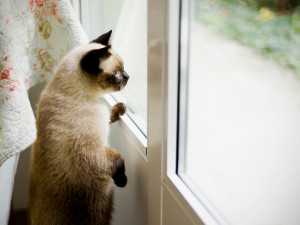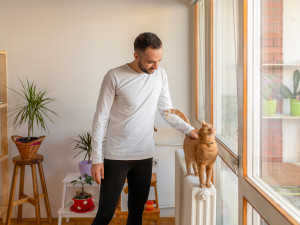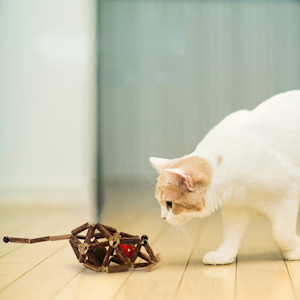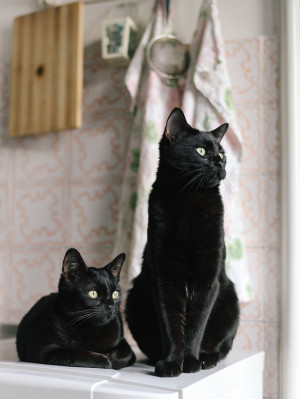Is Your Cat’s Separation Anxiety Ruining Their Life and Yours?
Why your cat freaks out when you’re away (and how to help).
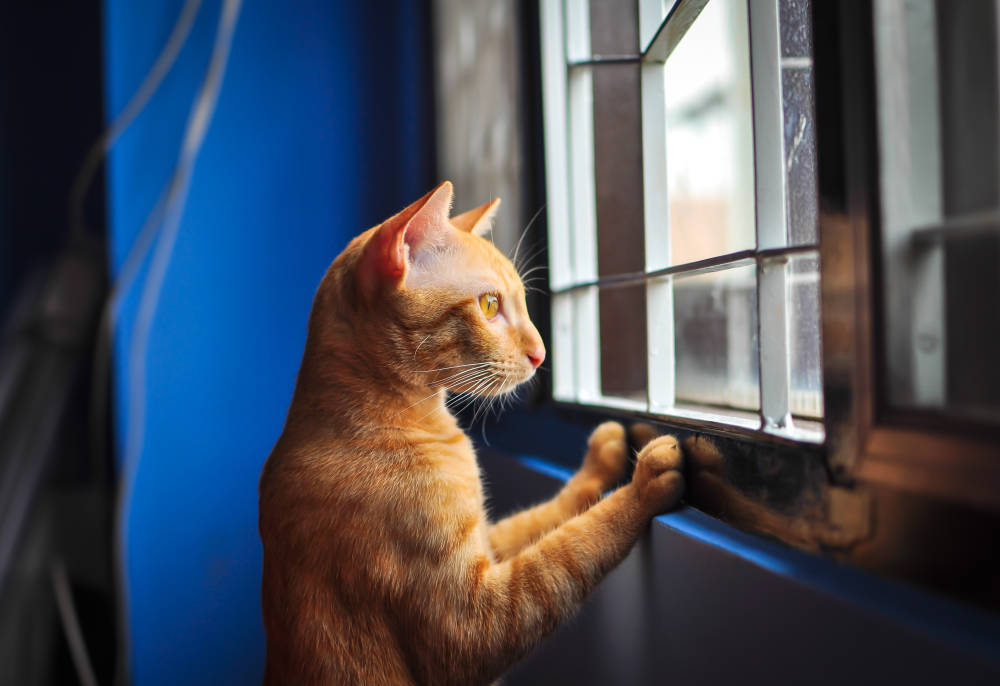
share article
It’s tough to leave your cat home alone. It’s even harder if your cat ruins the furnitureopens in a new tab and makes a mess outside the litter box while you’re gone. If those behaviors stop when you’re back, your cat might have separation anxiety, says Stephen Quandtopens in a new tab, a certified cat behavior specialist and owner of Cat Behavior Helpopens in a new tab. As with separation anxiety in dogsopens in a new tab, losing a family member or experiencing changes in routine or surroundings are a few things that can worsen anxiety symptoms. Here’s how to spot and treat your cat’s separation anxiety, per Quandt.
What is separation anxiety?
Separation anxiety is when pets — cats or dogs — become distressed and anxious when separated from their pet parents. Quandt says separation anxiety isn’t exactly loneliness, but rather an over-dependence on caretakers.
“It’s hard to know exactly what cats feel when they have anxiety because they can’t talk to us with words. However, they do talk to us with behavior and body languageopens in a new tab. This helps us infer that our cats are feeling poorly and are in some degree of distress,” Quandt says.
What are signs of separation anxiety in cats?
Separation anxiety can look a lot like other medical conditions. That’s why Quandt says to visit your veterinarian if your cat exhibits any of these signs:
Pacing
Over-grooming
Destructive behavior (for example, aggression and furniture scratchingopens in a new tab)
Pooping or peeing outside the litter boxopens in a new tab
Low energy or depressedopens in a new tab
A cat who is showing one or more of these behaviors all the time (even when you’re home) may have a medical condition rather than an emotional one, Quandt adds.
You may also see a similar behavior in bored cats. “If the cat’s negative behaviors occur in the pet parent’s presence, behaviors like meowing, scratching objects, and attention begging are examples that the cat is likely bored,” Quandt says. In comparison, negative behaviors associated with separation anxiety happen when you’re away and are due to distress.
What causes separation anxiety in cats?
Quandt says separation anxiety might be somewhat of a natural trait in cats who have various personalities. But cats who form strong attachments to their humans are more likely to experience separation anxiety, such as a single bottle-fed kitten. Therefore, separation anxiety could stem from genetics, life experiences, or a combination of the two.
Any of these below factors could trigger separation anxiety.
Being Left Alone
Cats vary in how long they can cope alone or with a sitter. Some cats get stressed after an hour, a day, or days. In one rare case, Quandt recalls a cat who marked doorways any time their parent left the room.
The Death of a Family Member
We can’t be sure that cats understand the concept of death, but they recognize and respond opens in a new tabto the absence of another person or pet. Because cats can pick up on our moods, separation anxiety in cats can worsen when their caretaker grieves the same person or pet.
Moving
Moving can be a stressful timeopens in a new tab for people, but it’s especially difficult for cats who rely on familiar places and smells to feel secure. As a result, a cat in a new home might become more reliant on human family members’ company.
A Change in Routine
Cats love their daily routines just as much as familiar places and faces. This means sticking to a typical routine as much as you can.
Breed
Siamese and Burmese cats are more prone to separation anxiety than other cats. “This could be the result of their tendencies to be more codependent on their humans opens in a new tab than other breeds,” Quandt says.
Age
As pets get older,opens in a new tab they may experience hearing or vision loss, or develop senior cat health issuesopens in a new tab such as kidney disease or cognitive dysfunction, which is like Alzheimer’s in humans. Any of these conditions can make it harder for a cat to cope with changes in routine or time away from their humans.
How can you help your cat with their separation anxiety?
To help your cat keep their cool while you’re away, you can try desensitization training. To do this, gradually increase the time your cat spends alone, starting with short sessions that don’t upset your cat. Consider using the following tips to make solo time more enjoyable for cats:
Ghost Your Cat
“The number-one mistake people make with all the best of intentions is smothering their cat with attention just before they leave the home. As a result, your absence is felt much more intensely,” Quandt says. Avoid rattling keys, making a big fuss saying goodbye, or rushing around to collect your things. Leave gently. Kiss and cuddle your cat once you’re back home, he suggests.
Keep Them Entertained
Quandt says adding enriching elements to a cat’s life can reduce stressopens in a new tab. This includes food puzzlesopens in a new tab, bird videos, scratching postsopens in a new tab, and perchesopens in a new tab. Cat treesopens in a new tab and cozy “igloo” beds, preferably with some used clothing of the pet parent, can also be beneficial because cats express status with height and feel secure in enclosed spaces.
Create a Chill Environment
Did you know there’s music just for soothing cats? It’s called species-appropriate musicopens in a new tab, and it’s composed of purrs, suckling, and other friendly sounds used in cat-to-cat communication. That, paired with pheromones mimicking a cat’s natural communication scents, can help your kitty chillopens in a new tab, Quandt says. “Before administering anything orally to your cat like calming treats, liquids, or CBD productsopens in a new tab, check with your vet first,” he adds.
Hire a Sitter
You can find good pet sitters on apps, such as Nextdooropens in a new tab, Roveropens in a new tab, or Meowtelopens in a new tab. They’ll accommodate your and your cat’s needs by stopping in for short visits or staying at your home while you’re away.
Will getting another pet help my cat’s separation anxiety?
Not necessarily, Quandt says. Your cat doesn’t really miss you because they’re lonely. They’re missing you because they’re too attached to you or someone else who takes care of them. Another pet opens in a new tabcould make your cat more stressed and act out even more. This could work for some cats, but it’s not the solution for every household.

Janelle Leeson
Janelle Leeson is a Portland, Oregon-based freelance writer. Her work has been featured in magazines such as Inside Your Dog’s Mind, Inside Your Cat’s Mind, and Paw Print, as well online at Insider Reviews, NBC Select, Shop Today, PetMD, and Daily Paws. She has two adventure cats, a flock of urban chickens, and a soon-to-be-husband who doesn’t mind housing the occasional foster cat — or five.
Related articles
![Woman using a laptop in bed, looking at her cat]() opens in a new tab
opens in a new tabWhat to Expect in the First 48 Hours With Your New Cat
Here’s how to help your rescue kitty feel at home.
![Muscular white pit bull stands on couch, looking out window to sunny fall day.]() opens in a new tab
opens in a new tabSeparation Anxiety in Dogs
Does your dog freak out when you head for the door? Here’s some advice.
- opens in a new tab
Do Anxious Dog Parents Raise More Anxious Dogs?
Which comes first: a nervous person or a nervous pup?
![Woman holding her dog beside a window in bright morning light]() opens in a new tab
opens in a new tabPet Parents Get Separation Anxiety, Too
We asked both animal behaviorists and human psychologists how you can deal with leaving your dog home alone.
![Young woman hugging her small black dog on the couch]() opens in a new tab
opens in a new tabWho Has More Separation Anxiety — You or Your Dog?
It was a trick question. A study shows that the pandemic has made us all codependent.
